Alexander Murdoch
(1841-1891) - A Scottish Engineer, Poet, Author, Journalist
Alexander Murdoch was born in Taylor Street, St Mungo Parish, Glasow on
23rd of April 1841. It was only in later years that he added his
mother's surname, Gregor, as his middle name.

His parents were James
Murdoch (Sawyer) and Rebecca Gregor, who, in addition to Alexander in
1841, had a John in 1839, a Jean/Jane in 1843, and a Rebecca in 1846.
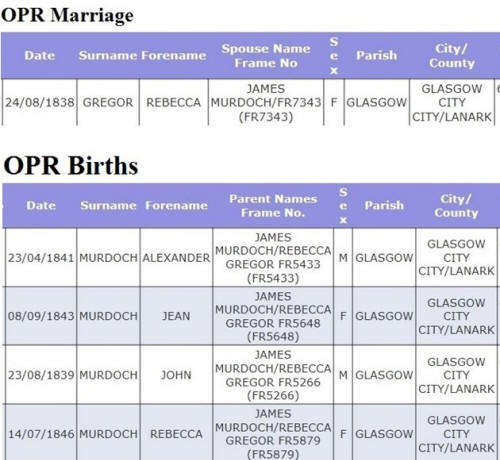
The 1841 Census taken on
the 6th of June, 1841, shows the then family of four in Taylor Street,
thus,

The 1851 Census for 37
Taylor Street, taken on the 30th March, 1851, shows Alexander as a
Scholar, his mother Rebecca, as Head of House, a Victualler to trade,
and her other three children. Her husband James is not listed, so had
possibly died between 1841 and 1851.
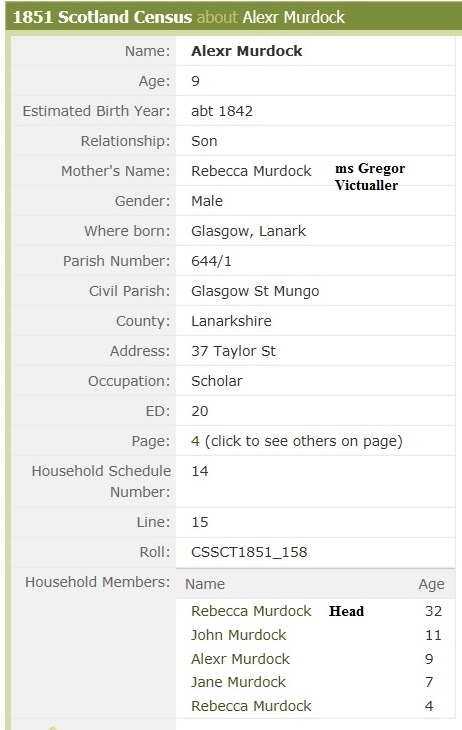
The 1861 Census for 41
Taylor Street, taken on the 7 April, 1861, shows Alexander as an Engine
Fitter, his mother as a Grocer, her son John as a Warehouse Muslin Clerk
and her daughter Jane as a Warehouse Muslin Girl.
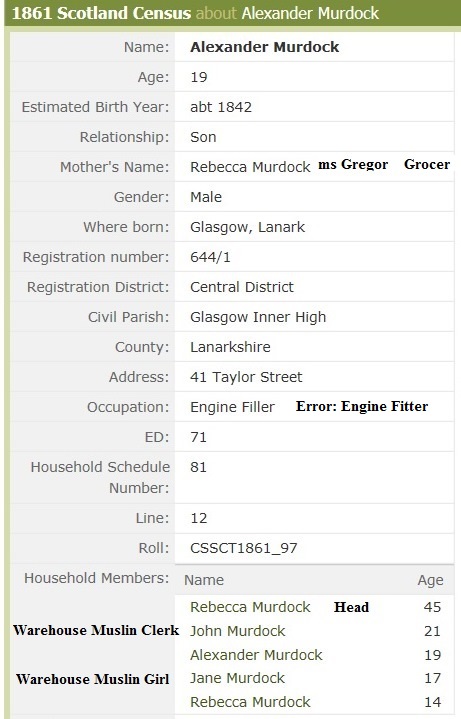
In 1867, Alexander,
describing himself as a Journeyman Engine Fitter, married Marion Calton
in her home at 16 Hospital Street, Glasgow.

The 1871 Census for 121
Duke Street, Glasgow, taken on the 2nd of April, 1871 shows Alexander as
a Sewing Machine Maker (probably with the Singers Sewing Machine
Company) with his wife Marion and two children, Alexander Jnr., aged
three and William aged 8 months.
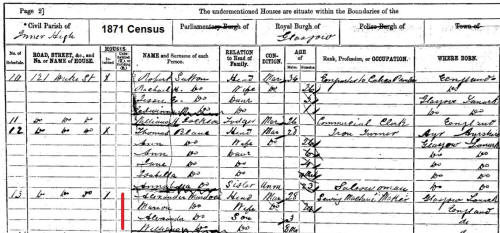
It appears that his
marriage and the births of another four children before the 1881 Census
on the 3rd of April, 1881, did not in any way hamper Alexander Snr.'s
literary efforts and ambitions in the 1870s, for, not only did he
contribute many serious and humorous poems to the 'Glasgow Weekly Mail',
but also published two volumes of poetry, namely, 'Lilts On A Scottish
Lyre' in 1873 and 'The Laird's Lykewake and Other Poems' in 1877. Then
in 1879 he won the medal offered by the committee of the Burns Monument
at Kilmarnock for a poem on the Ayrshire Bard and afterwards accepted a
position on the staff of the 'Glasgow Weekly Mail'.

While with the 'Mail',
Alexander G. Murdoch, as he then styled himself, developed his prose
ability by writing several popular serial stories and then published at
least two more books, namely, 'Recent And Living Scottish Poets' in
1883, and 'Scotch Readings - Humorous And Amusing' in 1889. But sadly,
he died of Nervous Debility and Pleurisy at his home in 38 Bellgrove
Street, Glasgow, on the 12th February 1891.


Mr Alexander Murdoch requests me to write a
few words of recommendatory Preface to his volume of Poems. This I do
with pleasure. He is one of our best recent recruits to the school of
Poets who went by the name of the “Whistlebinkie School,” many of whom
were real accessions to the list of our genuine Scottish Minstrels. Most
of them, indeed, might never have tuned their lyres at all but for
Burns, but still they were not slavish imitators of the Ayrshire Poet;
and, working in the same exhaustless mine of Scottish customs,
character, and scenery, they have brought out a great deal that is new
and valuable. The imitators of Pope found themselves in a vacuum—they
might have the style and even some of the genius, but they had no new
manners or phases of character to describe in England. It was used up
completely, and hence, while some degenerated into mere twaddle and
sound, Goldsmith, the best of them, had to go to Ireland, in his “Deserted Village,” and to the Continent, in his “Traveller,” in search
of new matter for his muse. But Scotland, till Bums arose,
“Lay like some unheard-of Isle
Ayont Magellan.”
Airid even after what he and Scott and Galt
and Wilson did for its discovery and disinterment, there remained a
great deal to do, and our Westland bards and Scottish novelists have not
even yet exhausted its rough and fineless riches.
A great deal of true Scottish raciness is to be found in Mr Murdoch’s
verses. The first poem which I remember perusing when it first appeared
is entitled the “Laird’s Lykewake,” and in part fulfils what had long
been a cherished ideal of ours—the poetry and interest of a Lykewake. We
remember well when that curious old Scottish custom was in full vogue,
and was observed in respectable as well as poor houses, and have been
present at one or two celebrations of it. There was a strange
combination of elements in its observance, which gave it a weird and
eery aspect, half ludicrous and half terrible. In a corner of the room
reposed the cold corpse of what had been perhaps the day before an
eminent preacher of the Gospel, who had died full of vigour, although at
his grand climacteric, of a very short and alarming illness ; or else of
some young and promising individual who had perished of a wasting
disease, with the salt on his breast, and a heart-heard whisper so
stilly low, which seemed to say, “ It is for ever.” In the centre of the
table, which stood in the middle of the room, stood a giant bottle of
smuggled whisky, flanked by oatcakes and a kebbock. Stationed around the
room were a variety of persons, young and old, grave and gay; here a
solemn elder quoting texts of Scripture, at first in a clear
unembarrassed tone, by-and-bye with a slight hiccup, as the aqua did its
office, and the morning light was approaching; and there a professed
jester—the jester of the village, a stocking-weaver to trade—with a
demure, hypocritical air in his waggish features, which by-and-bye,
under the same genial influence, warmed and waukened till his every word
was a quip, and his every sentence a droll story, and the room, the
bottle, the guests, and the bed on which the corpse was lying, shook
with unextinguishable laughter; and yonder a boy of thirteen, who,
between the sorrowful’ feelings awakened by the recent death and the
sight of his father’s body, and the ludicrous emotions started by the
strange stories, became a mere pendulum between a smile and tear, and
found his only relief in looking out, from time to time, on the night,
and seeing the Great Bear slowly lifting up his mighty stature toward
the zenith, and by-and-bye the first peep of the late October dawning
tinging the eastern horizon and unshadowing the northern mountains. It
was strange how the awe at first felt in the presence of a corpse, and
the superstitious dread of some lest demons should snatch it away, and
the love and sorrow for the departed, gradually yielded to the other
extreme of mirth, even as of all dinners that succeeding a funeral is
often the most redolent of laughter. Such a thing of shreds and patches,
of contradictions and sharp contrasts, is Human Nature, and such a
unique discovery of human nature was a “Scottish Lykewake.” Mr Murdoch’s
poem, the “Lyke-wake,” if not quite up to the mark of a subject worthy
of a Shakespeare or Burns, is a very clever production, and some of its
tales, besides being entertaining, contain touches of genius.
There is a spirited poem on “ Druinclog,” in the style of Macaulay’s “
Lays of the Boundheads.” Better than this is the “Midnight Forge,”
reminding us somewhat of Samuel Fergusson’s massive “ Forging of the
Anchor.” The following lines deserve quotation:—
“Bring out the molten monster, then, he's
ready, he's aglow.
And force his sides to battle with the steam god’s crushing blow ;
Hang on the cranes! heave out the chains! the white mass swings in air;
Heavens! what a scorching heat he casts, and what a blinding glare.
As white as seething foam he glows, and every bursting pore
Throbs with the fevered blood of fire, and spouts the molten gore.
O! in the sturdy olden days of foray and of fight,
When frequent in our Scottish hills arose the beacon light,
Had such another molten mass as this been lifted high,
Its gleaming terrors would have scared the white stars from the sky,
Flashed down a gray and angry glare on startled crag and lawn,
Disturbing the wild eagles’ sleep with dreams of early dawn;
Aroused the burgher of the town, the shepherd of the glen,
And put the sword-hilts in the grasp of roughly honeBt men.”
In his “Miscellaneous Poems and Sonnets” Mr
Murdoch seems to say, “Paullo majora canamas” These poems are in
English, and written with more effort and elaboration than his Scotch
verses. And such poems as “The Poet’s Mission,” “Behold the Man!” “John
Bunyan in Prison,” and his very striking strain entitled a “Hymn to the
Stars,” written at midnight in Glencoe, must be attractive to a class of
readers who may care less for his “Kirs’nen o’ the Bairn,” or “When ^the
Bairns are laid in Sleep.” It says much, however, for the versatility of
the Poet’s powers that he has written poems of nearly equal merit in
both languages, although we, for our part, prefer his English verses.
The first two stanzas of the “Hymn to the Stars” strike us as almost
sublime.
Very notable, also, are his poems of kindred purpose and power, entitled
“Robert Burns,” and the “Burns Statue,” which are sure to be read with
peculiar interest in this year of grace 1877, when the Glasgow working
men have done such honour to themselves and their city in erecting a
Statue to the Poet, contributed to in shillings, and where every
shilling implied self-sacrifice. These two poems we might quote, but the
book containing them is already in our readers’ hands, who will see in
Mr Murdoch’s strong chisel.
“A brawny peasant, mired with clay, and
rough with honest toil;
A ploughman striding manfully across the furrowed soil;
The sunlight on his bare bold brow, and in his heaving breast
The lion leap and flash of song that robbed him of his rest.”
In tenderer and more pathetic strains his
“By a Poet’s Grave” mourns over the fate of a hapless son of genius—the
late James Macfarlane, of whose collected poems we are glad to learn
that an edition has been promised by Mr H. Buchanan MThail, of Glasgow,
an early friend of the Poet’s, and in whose family lair the neglected
and unfortunate bard now sleeps.
Had space permitted we might have mentioned as very good in a different
style the “Rent Day,” “That Bates a’,” “Blythe Johnny Maut,” “Plittin*
Day,” “The Hoose Takin*;” and in another style still "Expiation,” and
“Alpine, the King Slayer.” But our purpose is now accomplished in
recommending Mr Murdoch’s book as one of great and varied merit. It is
quite evident that the book has faults, and would be greatly improved by
a little more labor limce. But what gratifies us most about it is that
we think we see marks of distinct growth and advancement, and that the
Author is writing a great deal better since his first poems appeared,
and we entertain high hopes—on the condition of his writing better and
better still—as to his future career.
GEORGE GILFILLAN.
Dundee, 25th January 1877.
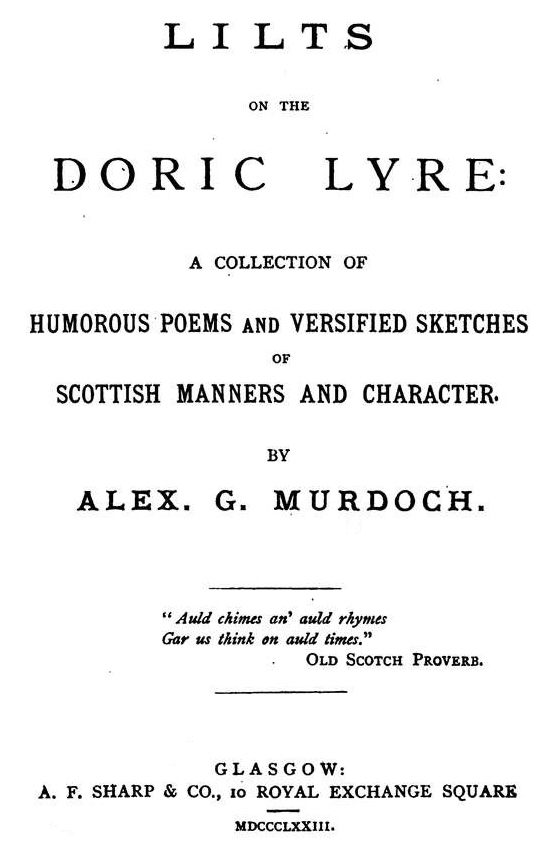
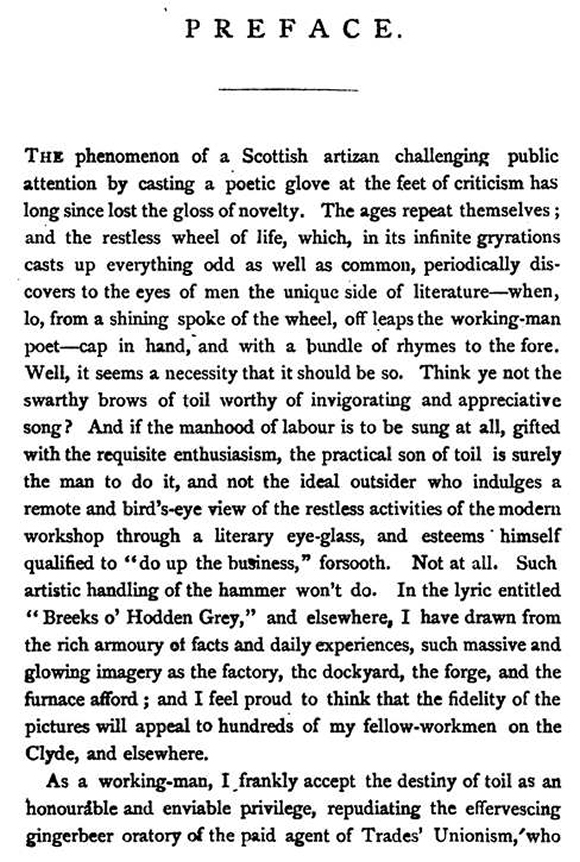
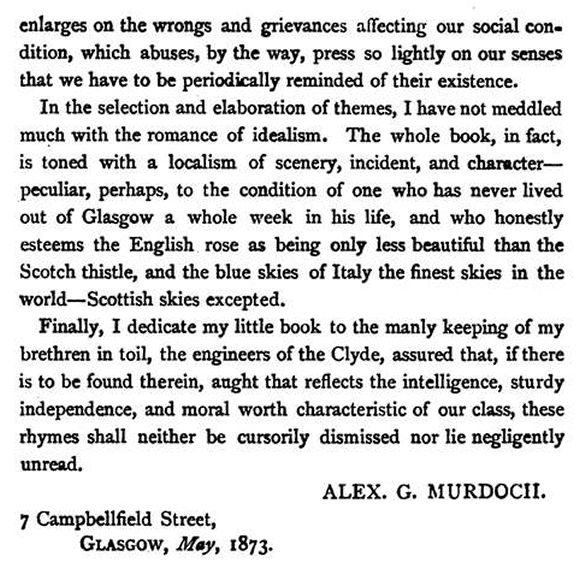

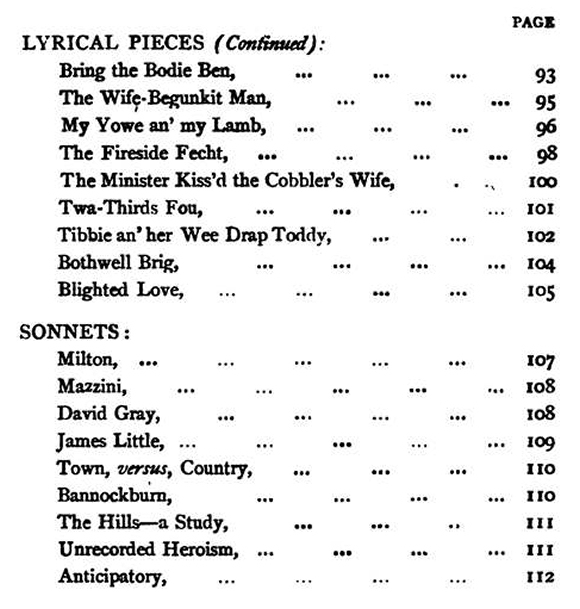
Download
'Lilts
On A Scottish Lyre' here (pdf)
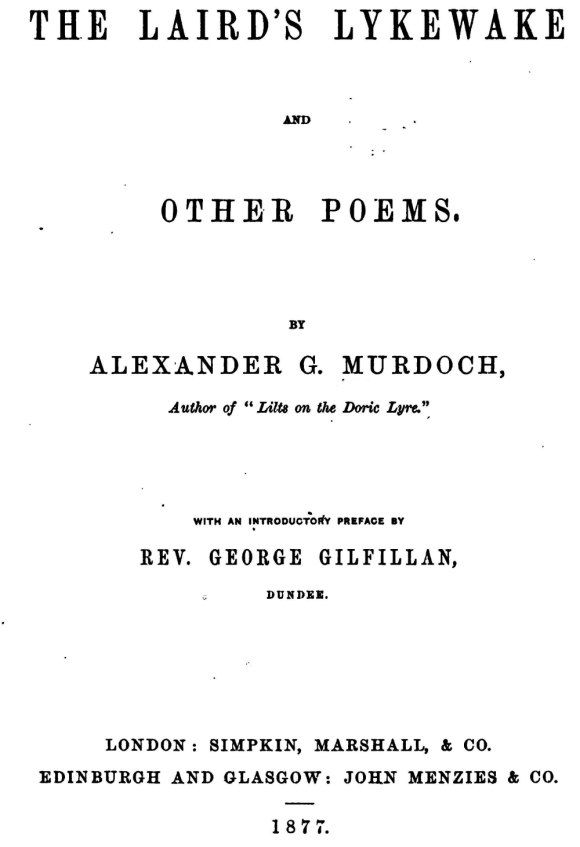

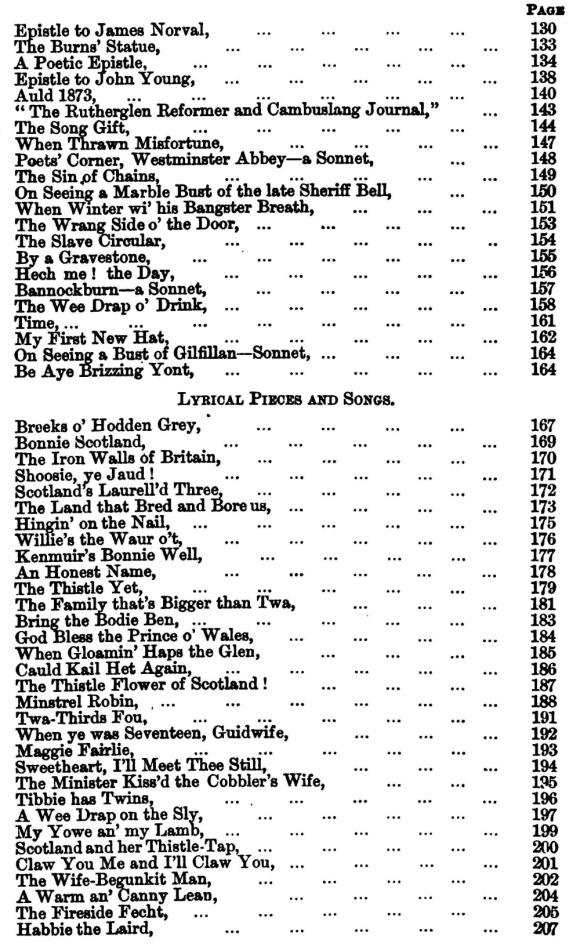
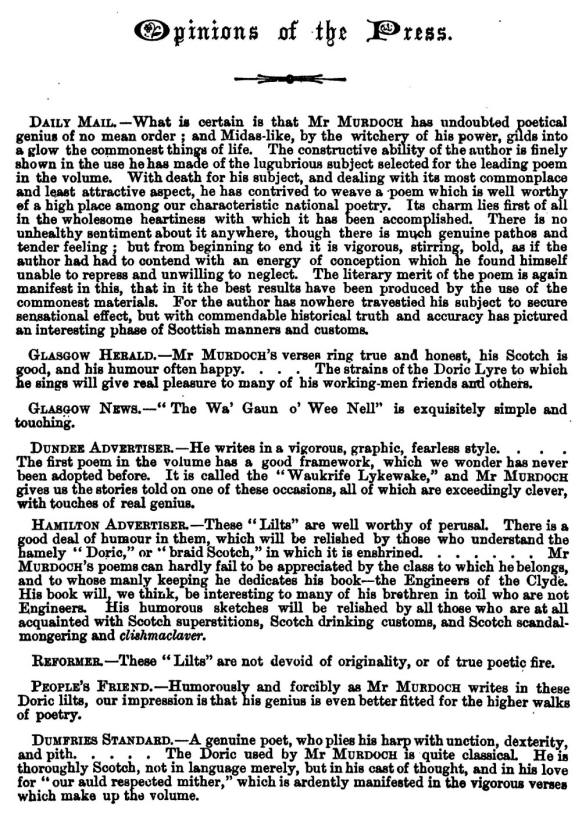
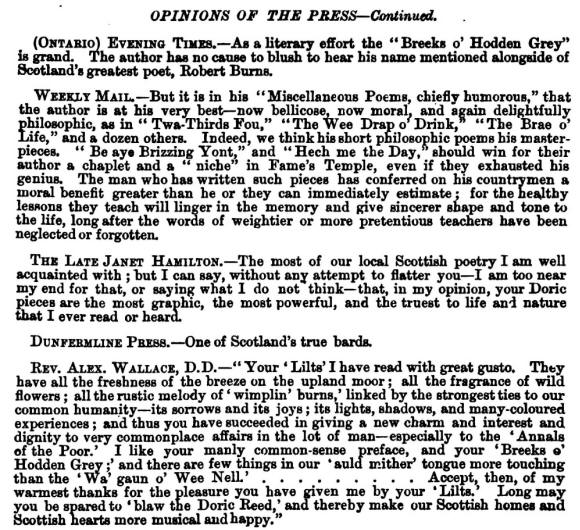
Download "The
Laird's Lykewake" here (pdf)
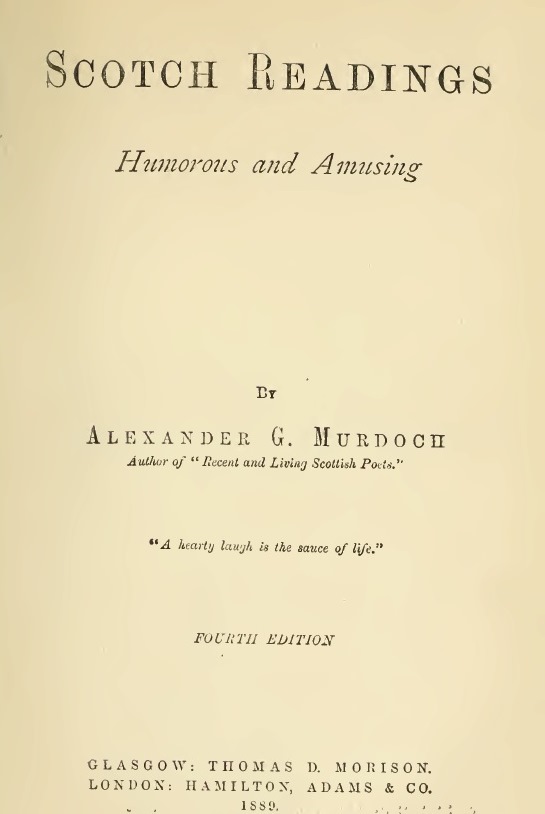

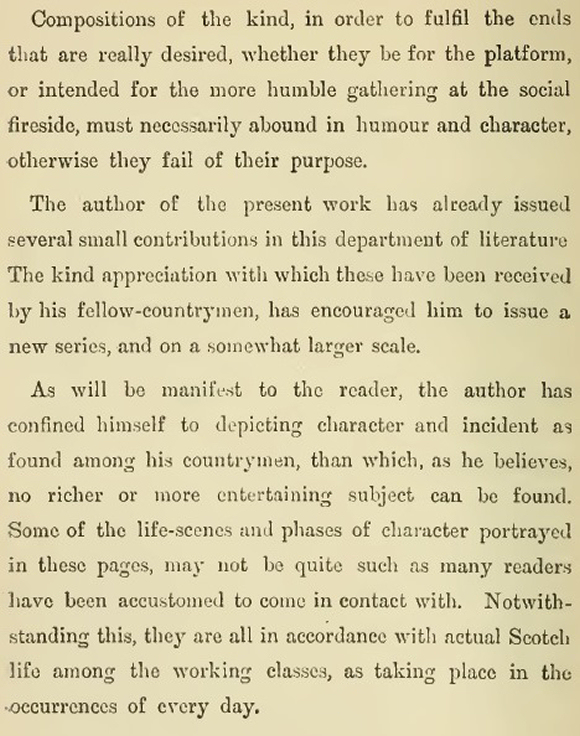
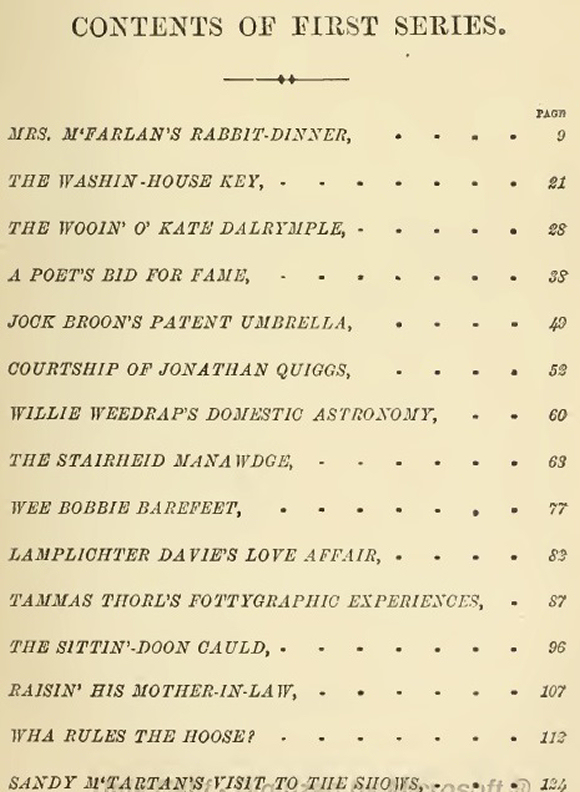
Mrs M'Farlan's Rabbit
Dinner
The Washin-House Key
The Wooin' O' Kate
Dalrymple
A Poet's Bid For Fame
Jock Broon's Patent
Umbrella
The Courtship of
Jonathan Quiggs
Willie Weedrap's
Domestic Astronomy
The Stairheid Manawdge
Wee Bobbie Barefeet
Lamplichter Davies
Love Affair
Tammas
Thorl's Fottygraphic Experiences
The Sittin'-Doon Cauld
Raisin' His Mother-In-Law
Wha
Rules The Hoose?
Sandy M'Tartan's
Visit to the Shows
Johnny Gowdy's Funny Ploy
The Mendin' O'
Johnny MacFarlan's Lum Hat
The Ministers Mistake
The Tailor Mak's The Man
Jock Turnips
Mither-In-law
Lodgings at Arran
Oor John's Patent Alarum
Mrs. MacFarlan
Gangs Doon The Water
Sandy M'Tartan's
Voyage to Govan
Robin Rigg and the
Minister
Johnny Safty's Second
Wife
The Gas Account Man
Davie Tosh's Hogmanay
Adventure
Gleska Mutton, 4d Per
Pound
Jean Tamson's Love
Hopesm and Fears
The Amateur Phrenologist
Peter Paterson, The Poet
Coming Hame Fou
The Bathing of the Stick
Leg
When is a Man Fou?
Washin' Jean's Comic
Marriage
Doon the Watter in
the Aulden Times
Tammy Gibb's Lan' O' Houses
Shirt
Washing in a Twopenny Lodging-House
How
Archie MacGregor Paid Out The Horse-Cowper
Tam Broon's Visit to
London
Geordie Shuttle Up The
Lum
Sandy MacDonald's
First-Foot

